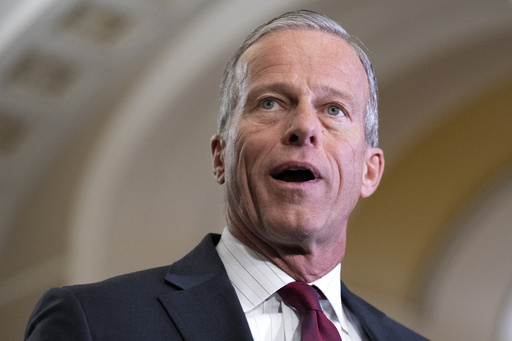WASHINGTON — Senate Republicans have taken initial steps toward developing a $340 billion budget bill primarily aimed at supporting President Donald Trump’s immigration and border security initiatives. However, the process was complicated when Trump publicly criticized the approach taken by the Senate Budget Committee chairman, Sen. Lindsey Graham of South Carolina, favoring instead a more extensive plan proposed by House Republicans that includes $4.5 trillion in tax reductions and other key objectives. The Senate Republicans had preferred to tackle these topics in subsequent phases.
President Trump’s intervention has led to a significant disruption as he asserted on social media that the House’s version of the budget encapsulates his entire “America First Agenda,” rather than just parts of it. He emphasized his desire for a singular, comprehensive bill that encompasses all Republican priorities. Meanwhile, Vice President JD Vance was en route to the Capitol to discuss these developments with Republican senators.
The announcement caught Senate Republican leadership off guard, with Senate Majority Leader John Thune remarking that he was unprepared for such a reaction. Thune had orchestrated the plan for a two-bill framework with the aim of securing an early win for the administration, while the House is currently in recess. He expressed a commitment to move forward with the process, all while seeking clearer guidance from the White House.
The sudden shift adds additional complexity to an already challenging budget scenario. Although Republicans hold majorities in both the House and Senate, they face considerable obstacles in translating Trump’s policy aspirations into legislative reality, especially as Democrats mobilize to counteract the proposed measures.
On Tuesday, Republicans successfully advanced the initial stage of the budget through a narrow 50-47 party-line vote. This was intended to open the door to fulfilling Trump’s campaign promises concerning tax policy, energy production, and immigration enforcement.
However, the Trump administration’s drive for efficiency has resulted in substantial budget cuts across various federal departments, leading to job losses and the reduction of essential programs. In response, Democrats, who had initially struggled amid the tumultuous climate, are now actively warning the populace about the implications of the proposed changes.
Senate Democratic leader Chuck Schumer criticized the Republican plans, arguing that they primarily serve the interests of wealthy individuals while burdening the average American with the costs. He organized a strategy meeting with fellow Democratic senators to confront the GOP’s emphasis on tax cuts that disproportionately benefit the rich, which would come at the expense of critical services like healthcare and veteran support.
A lengthy budget debate is set to commence this week, featuring an initial 50 hours of discussion, followed by an anticipated overnight session filled with proposed amendments. The Republican budget proposal allocates $175 billion towards immigration enforcement, including funding for mass deportations and the construction of the border wall, along with an additional $150 billion for the Pentagon and $20 billion for the Coast Guard.
Despite this tumult, Republican leaders remain determined to move forward, spurred on by warnings from Trump’s immigration officials about funding shortages for their priorities.
In a previous meeting with Republican senators, Trump had indicated no strong preference for either approach to the budget but urged Congress to deliver results. The Senate Budget Committee has indicated that its proposed plan would require about $85.5 billion annually over four years, funded by cuts and alternatives drawn up by other committees.
As Republicans explore options to finance their proposal, they are considering rolling back a methane emissions fee enacted by Democrats in the Inflation Reduction Act and looking for new revenue opportunities through energy leasing to enhance domestic energy initiatives.
In contrast, the House GOP’s plan is vastly larger, proposing $4.5 trillion in tax cuts and up to $2 trillion in reductions across various social programs over the next decade. This approach is expected to deepen divisions within the party, especially among hard-right factions.
The current budget deliberations fall under the reconciliation process, which simplifies passage through a simple majority vote. This mechanism is increasingly employed in today’s political environment, allowing both parties to implement substantial legislative agendas despite partisan divides, as evidenced by the use of reconciliation during Trump’s initial term for tax cuts, and more recently by Democrats for COVID relief packages and the Inflation Reduction Act.




